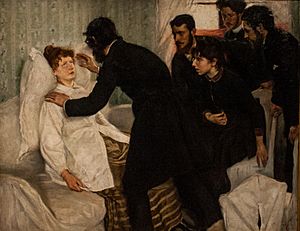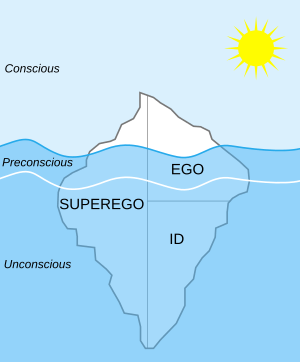Unconscious mind facts for kids
The unconscious mind is a part of your mind that works without you even knowing it. It's like a hidden part of your brain that influences your feelings, thoughts, and desires. Sometimes, ideas or emotions might pop into your head, and you wonder where they came from. That's often your unconscious mind at work!
The idea of the unconscious mind isn't new. People have thought about it for a very long time, across many different cultures. The term "unconscious mind" was first used by a German philosopher named Friedrich Wilhelm Joseph Schelling in the 1700s. Later, a poet named Samuel Taylor Coleridge helped bring the idea into the English language.
What Did Freud Say About the Unconscious Mind?
A famous thinker named Sigmund Freud talked a lot about the unconscious mind. He believed it was super important for understanding why we think and act the way we do. Freud developed a way to study the mind called psychoanalysis.
It's important to know that Freud didn't "discover" the unconscious mind. Many thinkers before him knew it existed. Freud's big contribution was creating a method to study it in a detailed way. However, his methods and ideas are still debated by scientists today.
Freud called dreams the "royal road to the unconscious." He thought that by studying dreams, we could learn about our hidden thoughts and feelings. He wrote a book about this called The Interpretation of Dreams in 1899.
Freud also talked about the preconscious. This is like a middle layer between your conscious thoughts (what you're aware of now) and your unconscious thoughts. You can usually access preconscious thoughts with a little effort.
One key idea from Freud is repression. He believed that people sometimes push painful memories or difficult feelings deep into their unconscious mind. This happens without them even realizing it.
The Adaptive Unconscious
The adaptive unconscious is another way to think about how our unconscious mind works. It's a set of mental processes that help us make decisions and judgments very quickly.
This part of the unconscious is different from our conscious thinking. It's much faster and doesn't require much effort. It focuses a lot on what's happening right now. However, it's less flexible than our conscious thoughts.
Some theories say the unconscious only handles simple tasks. But the adaptive unconscious is thought to do more complex things, like helping us set goals.
The word "adaptive" means it helps us survive. This part of our mind probably developed over a very long time through natural selection. It helped our ancestors make quick decisions to stay safe. For much of vertebrate evolution, all mental activity was unconscious. For example, no one thinks that fish have consciousness. So, our conscious mind was added to an older system that already worked without us being aware of it.
See also
 In Spanish: Inconsciente para niños
In Spanish: Inconsciente para niños
 | Tommie Smith |
 | Simone Manuel |
 | Shani Davis |
 | Simone Biles |
 | Alice Coachman |



